Publications
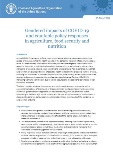
Gendered impacts of COVID-19 and equitable policy responses in agriculture, food security and nutrition
30/06/2020
This brief compiles evidence from current and previous epidemics to explore the socio-economic implications of the impact of the pandemic on food systems and rural economies, and how a gender-sensitive approach can help address key policy issues related to the functioning of food and agricultural systems and the special circumstances of rural women. It also provides concrete policy recommendations to mitigate the impacts of the pandemic on rural women and girls. 10 pp.
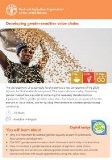
Developing gender-sensitive value chains
23/06/2020
This fact sheet describes the course that addressed why eliminating gender inequalities is pivotal to achieving the necessary transformations. It proposes FAO’s gender-sensitive value chain framework as an approach for the analysis of value chains, and for guiding interventions to address gender-based constraints. 2 pp.
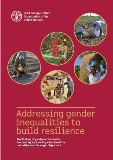
Addressing gender inequalities to build resilience Stocktaking of good practices in the Food and Agriculture Organization of the United Nations’ Strategic Objective 5
16/06/2020
This report documents good practices and lessons learned from around the world with a specific focus on emergency and humanitarian situations. The information in this report can be used as good practices that can help increase resilience of livelihoods in a gender-equitable manner. They can also be used for advocacy, to engage policy makers and practitioners to promote gender equality, and women’s empowerment in resilience and humanitarian. 48 pp.
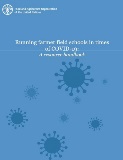
Running farmer field schools in times of COVID-19
03/06/2020
This handbook provides guidance and suggestions to farmer field school (FFS) facilitators, master trainers, project coordinators and rural advisors on running FFS and other agricultural training activities in times of COVID-19. It includes basic protective measures, important considerations, proposed FFS activities, links to the World Health Organization (WHO) resources and videos and more. 83 pp.
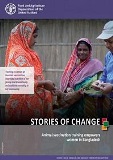
Animal vaccination training empowers women in Bangladesh - Stories of change
28/05/2020
In Bangladesh, the FAO Upazila to Community (U2C) initiative believes that by giving training on vaccination, biosecurity and surveillance to women, who are usually the custodians of livestock, it is possible to improve livestock health and ensure food security in their communities. This happened with Helena, a 35-year-old poultry farmer, wife and mother-of-three, who became a community vaccinator after taking the training delivered by an Upazila livestock officer. 2 pp.
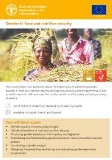
Gender in food and nutrition security
23/05/2020
This fact sheet describes the course that helps raise awareness about the importance of addressing gender equality in food and nutrition security and agricultural policy and programming. It also provides concrete skills and tools that can be used in real-life policy and programming situations. 2 pp.
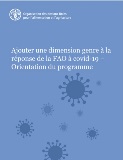
Adding a gender lens into FAO's response to COVID-19
10/05/2020
This publication provides programmatic guidance on integrating a gender lens in FAO's response to COVID-19. With the imposed social isolation and heightened social and economic pressures, women and girls’ vulnerability to domestic violence is projected to increase. In addition, this publication identifies key areas and actions that could be considered in FAO’s efforts to strengthen the resilience of farming households and communities and promote sustainable, resilient and 9 pp.
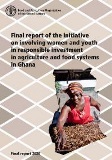
Final report of the initiative on involving women and youth in responsible investment in agriculture and food systems in Ghana
02/05/2020
This report describes a FAO initiative that sought to involve women and youth in responsible investment in agriculture and food systems (RAI) in Ghana. The initiative has involved discussions on an online forum where a wide group of people deliberated on issues that are relevant for women and youth in agriculture. Additionally, field visits, workshops, and a study on women and youth-led agribusinesses have been conducted. 40 pp.
